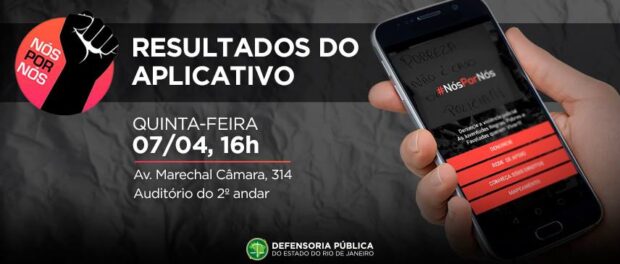
Two weeks after the launch of the “Nós Por Nós” (Us for Us) phone application, the Rio de Janeiro Youth Forum presented the results and challenges they have encountered since the app launch. The event took place at the state’s Public Defenders’ Office on April 7.
The Youth Forum developed a smart phone application designed for residents to quickly and safely denounce police violence by receiving videos, photos, texts and voice recording material from the source, to then be analyzed by the non-governmental Youth Forum and channeled to an appropriate institution for responding to the particular incident. Institutions receiving the material may include the human rights department at the public defenders’ office and a range of other human rights organizations.
The application was developed following the Youth Forum’s mapping of 15 favelas via the “Militarization of Favelas and the Impact on Black Youth” program which indicated a pattern of human rights violations carried out by the police. Fransérgio Goulart, one of the project coordinators, stated that “the tool will not necessarily solve all the problems in the favelas and the struggles that black youth face. But the application is an important instrument to fight back”.
In its first two weeks, the application was downloaded by 500 people and 40 incidents of police violence had been reported, indicating a popular demand and need for the app. The reports so far include homicide (two incidences in Borel and Acari), home invasion, violence against women, torture and abuse of power. The Youth Forum identified the Military Police, Municipal Guard, and the army as perpetrators of these violations. After analyzing the complaints, the Forum noted that the majority of reports implicated the Military Police as responsible for the violation. Goulart stated: “There is confusion about what the role of the police is.” The biggest challenge facing the team is to assure accuracy in reporting, including identifying the exact perpetrating agency, and then forward to the correct channel, in order to serve as legal evidence.

The majority of the reports came from the North Zone and South Zone, with some from the West Zone and the Baixada Fluminese. One of the Forum’s aims, Goulart stated, “is to spread the application across other regions of Brazil… We have been contacted by people from São Paulo, Mato Grosso do Sul and Ceará.”
The application has also proven effective in speeding up the communication process between the claimant and the support network. Goulart said: “We received complaints before but with the app responses arrive much faster. We’ve had complaints that arrived immediately, which sped up the support network and enabled quick answers with expertise and assistance to family members of victims, especially with the work of the Public Defenders’ Office.”
Public defender and coordinator of the Human Rights Nucleus, Fábio Amada, predicts that further partners will join the cause to end impunity for crimes committed against poor black youth.
Amada said: “In addition to the involvement of residents who suffer violence, it is also necessary to raise awareness of new agencies we can trust, both from the public and private sectors, to expand the network, go beyond the complaint and get all the possible means to suppress, prevent or reduce violations.”
Although the application has begun favorably, the Youth Forum faces several challenges. In order to improve the application technology and report on the systematization and referral of complaints the Forum seeks partners and funding. The Forum has been trying to raise money through crowdfunding online. The app is currently only available for Android users, though the Youth Forum is in the process of making it available to IOS users as well. Goulart explained that the decision to make the application available immediately for Android was because it is the mobile operating system most commonly used in Rio’s favelas.

